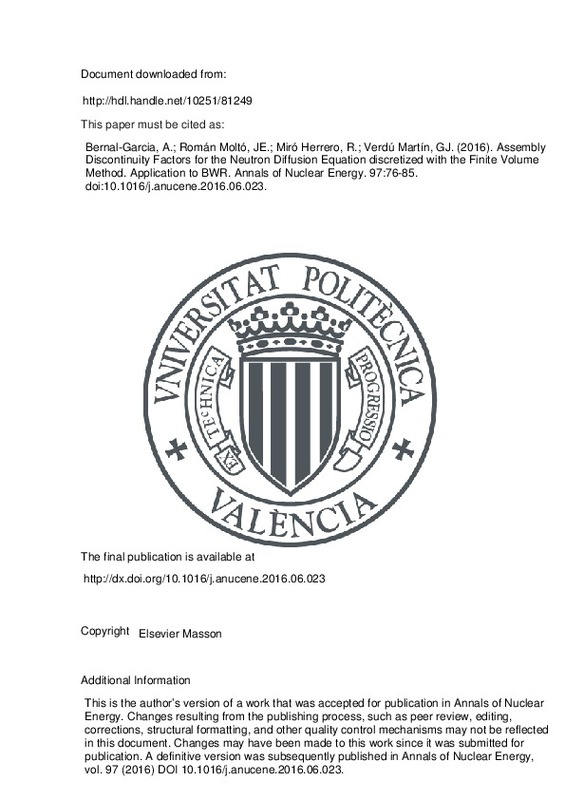Bernal-Garcia, A.; Román Moltó, JE.; Miró Herrero, R.; Verdú Martín, GJ. (2016). Assembly Discontinuity Factors for the Neutron Diffusion Equation discretized with the Finite Volume Method. Application to BWR. Annals of Nuclear Energy. 97:76-85. https://doi.org/10.1016/j.anucene.2016.06.023
Por favor, use este identificador para citar o enlazar este ítem: http://hdl.handle.net/10251/81249
|
Título:
|
Assembly Discontinuity Factors for the Neutron Diffusion Equation discretized with the Finite Volume Method. Application to BWR
|
|
Autor:
|
Bernal-Garcia, Alvaro

 Román Moltó, José Enrique
Román Moltó, José Enrique

 Miró Herrero, Rafael
Miró Herrero, Rafael

 Verdú Martín, Gumersindo Jesús
Verdú Martín, Gumersindo Jesús
|
|
Entidad UPV:
|
Universitat Politècnica de València. Escuela Técnica Superior de Ingenieros Industriales - Escola Tècnica Superior d'Enginyers Industrials
Universitat Politècnica de València. Escola Tècnica Superior d'Enginyeria Informàtica
|
|
Fecha difusión:
|
|
|
Resumen:
|
The neutron flux spatial distribution in Boiling Water Reactors (BWRs) can be calculated by means of the Neutron Diffusion Equation (NDE), which is a space- and time-dependent differential equation. In steady state conditions, ...[+]
The neutron flux spatial distribution in Boiling Water Reactors (BWRs) can be calculated by means of the Neutron Diffusion Equation (NDE), which is a space- and time-dependent differential equation. In steady state conditions, the time derivative terms are zero and this equation is rewritten as an eigenvalue problem. In addition, the spatial partial derivatives terms are transformed into algebraic terms by discretizing the geometry and using numerical methods. As regards the geometrical discretization, BWRs are complex systems containing different components of different geometries and materials, but they are usually modelled as parallelepiped nodes each one containing only one homogenized material to simplify the solution of the NDE. There are several techniques to correct the homogenization in the node, but the most commonly used in BWRs is that based on Assembly Discontinuity Factors (ADFs). As regards numerical methods, the Finite Volume Method (FVM) is feasible and suitable to be applied to the NDE. In this paper, a FVM based on a polynomial expansion method has been used to obtain the matrices of the eigenvalue problem, assuring the accomplishment of the ADFs for a BWR This eigenvalue problem has been solved by means of the SLEPc library. (C) 2016 Elsevier Ltd. All rights reserved.
[-]
|
|
Palabras clave:
|
Assembly Discontinuity Factor
,
Boiling Water Reactor
,
Neutron Diffusion Equation
,
Finite Volume Method
,
Eigenvalue problem
|
|
Derechos de uso:
|
Reserva de todos los derechos
|
|
Fuente:
|
Annals of Nuclear Energy. (issn:
0306-4549
)
|
|
DOI:
|
10.1016/j.anucene.2016.06.023
|
|
Editorial:
|
Elsevier Masson
|
|
Versión del editor:
|
http://dx.doi.org/10.1016/j.anucene.2016.06.023
|
|
Código del Proyecto:
|
info:eu-repo/grantAgreement/MECD//FPU13%2F01009/ES/FPU13%2F01009/
...[+]
info:eu-repo/grantAgreement/MECD//FPU13%2F01009/ES/FPU13%2F01009/
info:eu-repo/grantAgreement/MINECO//ENE2014-59442-P/ES/DESARROLLO DE NUEVOS MODELOS Y CAPACIDADES EN EL SISTEMA DE CODIGOS ACOPLADO VALKIN%2FTH-3D. VERIFICACION, VALIDACION Y CUANTIFICACION DE INCERTIDUMBRES/
info:eu-repo/grantAgreement/MINECO//ENE2015-68353-P/ES/DESARROLLO DE UN CODIGO DE TRANSPORTE NEUTRONICO MODAL 3D POR EL METODO DE LOS VOLUMENES FINITOS Y ORDENADAS DISCRETAS/
info:eu-repo/grantAgreement/GVA//PROMETEOII%2F2014%2F008/ES/New improved capacities in 3d-VALKIN (Valencian Neutronic Kinetisc). N3D-VALKIN/
info:eu-repo/grantAgreement/UPV//UPPTE%2F2012%2F118/
info:eu-repo/grantAgreement/MINECO//TIN2013-41049-P/ES/EXTENSION DE LA LIBRERIA SLEPC PARA POLINOMIOS MATRICIALES, FUNCIONES MATRICIALES Y ECUACIONES MATRICIALES EN PLATAFORMAS DE COMPUTACION EMERGENTES/
[-]
|
|
Descripción:
|
This is the author’s version of a work that was accepted for publication in Annals of Nuclear Energy. Changes resulting from the publishing process, such as peer review, editing, corrections, structural formatting, and other quality control mechanisms may not be reflected in this document. Changes may have been made to this work since it was submitted for publication. A definitive version was subsequently published in Annals of Nuclear Energy, vol. 97 (2016) DOI 10.1016/j.anucene.2016.06.023.
|
|
Agradecimientos:
|
This work has been partially supported by the Spanish Ministerio de Eduacion Cultura y Deporte under the grant FPU13/01009, the Spanish Ministerio de Ciencia e Innovacion under projects ENE2014-59442-P, the Spanish Ministerio ...[+]
This work has been partially supported by the Spanish Ministerio de Eduacion Cultura y Deporte under the grant FPU13/01009, the Spanish Ministerio de Ciencia e Innovacion under projects ENE2014-59442-P, the Spanish Ministerio de Economia y Competitividad and the European Fondo Europeo de Desarrollo Regional (FEDER) under project ENE2015-68353-P (MINECO/FEDER), the Generalitat Valenciana under projects PROMETEOII/2014/008, the Universitat Politecnica de Valencia under project UPPTE/2012/118, and the Spanish Ministerio de Economia y Competitividad under the project TIN2013-41049-P.
[-]
|
|
Tipo:
|
Artículo
|







![[Cerrado]](/themes/UPV/images/candado.png)


